Idioma del curso: Español e Inglés
3-Day Flash Sale!! Get This Exclusive ❄️WINTER SALE❄️
Learn & Master Orchestral Mockup Production Secrets From Award-Winning Composer Marc Jovani
With Our New Course...
"Symphonic Virtual Orchestration: Orchestral Mockup Production"
Lite Version
ATTENTION COMPOSERS! Get This Exclusive 👨 Father's Day 👨 Offer For A Limited Time... This special offer ends on .
Learn & Master Orchestral Mockup Production Secrets
From Award-Winning Composer
Marc Jovani
Introducing Our New Course...
"Symphonic Virtual Orchestration: Orchestral Mockup Production" Lite Version
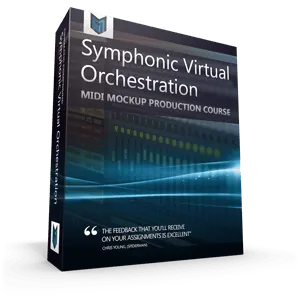
Flash Father's Day Sale!Order The SVO's Online Course Now And Save!
Regular Price: $497
Get The Course Today For Only:
$97.00

This Special Offer Ends On
Then the price will go up to $497


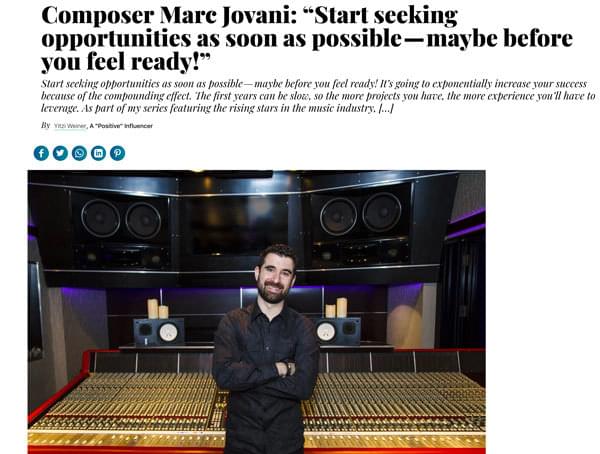

MusicTech.net - Music Production and Innovation
“If you’re seriously interested in getting into orchestral film and TV composition, then this is an incredibly focused (orchestral mockup production) course that is well worth”

“If you’re seriously interested in getting into orchestral film and TV composition, then this is an incredibly focused (orchestral mockup production) course that is well worth”
Inside Symphonic Virtual Orchestration
Lite Version

The Symphonic Virtual Orchestration Lite is a 10 Module Course (if you get the Power Package) with over 120 video lessons to help you grow you orchestral mockup production skills. The entire course is designed to give you the information, resources, motivation – and most importantly – the accountability that is essential to your long-term success.
120+ High-Impact Videos
Each lesson has been split into bite-sized chunks so you don't get overwhelmed with a flood of information. Take the course at your own pace, and really study the lessons as you apply the actionable lessons to your business.
Group Coaching
You will have the opportunity to work through any roadblocks you encounter during our Group Coaching Meetings. These are specific times the teachers at Cinematic Composing will be available inside of a video chat room where you can jump in to have your burning questions answered. Stay for as long as you'd like to listen in on other people’s questions, or leave as soon as you have your questions answered. These often turn into impromptu lessons as I elaborate on specific topics or start digging into someone's composing career.
Private Group With Everyone In The Community
Interact with other students who are going through some of your same struggles. Everyone inside of the community will be participating in group discussions inside our group. This will be a constant source of encouragement, accountability, community, and a place where lifelong friends will be forged.
Group Coaching
You will have the opportunity to work through any roadblocks you encounter during our Group Coaching Meetings. These are specific times the teachers at Cinematic Composing will be available inside of a video chat room where you can jump in to have your burning questions answered. Stay for as long as you'd like to listen in on other people’s questions, or leave as soon as you have your questions answered. These often turn into impromptu lessons as I elaborate on specific topics or start digging into someone's composing career.
Private Group With Everyone In The Community
Interact with other students who are going through some of your same struggles. Everyone inside of the community will be participating in group discussions inside our group. This will be a constant source of encouragement, accountability, community, and a place where lifelong friends will be forged.
Go At Your Own Pace
This special offer ends on .
BUT you can go at your own pace. Don’t need to follow the course’s schedule.
The course materials do not expire and you’ll have access to them for life. Even for the future course updates and improvements!
The duration is 6-8 weeks approx. You can do it a bit faster, or take as much time as you want/need.
Or you could even take advantage of the discount now, and be doing the course later.
The chat sessions get recorded and you can watch the replay whenever you want.
Marc Teaches You...

10 Topics, 12 Videos, 2h+ of content
First Steps
Introduction: Synthestration. Tactics for a good sound
Difference between Samples and Real Orchestra
Basics: Recording Dynamics
Balance
Panning
Layers: Distributing your Musical ideas
Volume: 7, 11, Kontakt, Audio, Gain, etc
Keyswitches
Equalization
And so much more...
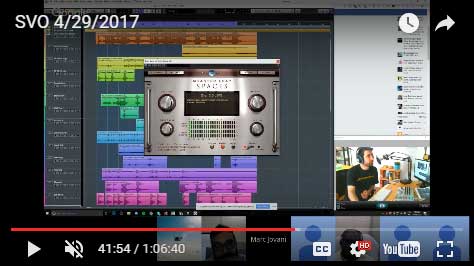
8 Topics, 11 Videos, 3h+ of content
Using Templates to Boost Productivity
Routing
Small & Big Templates. Pros & Cons
Minimal set-up
Modular Templates (Sonar & Cubase)
Organization: Groups, Kontakt Instances, Buses, Stems
Reverbs
Computer Specs

13 Topics, 14 Videos, 3h+ of content
Ready-to-go Tracks: Configured and pre-routed
Getting a Tight & Powerful Orchestral Sound
Orchestrating Percussion Beds: balance, panning, layers
Sequencing a Percussion Bed: step by step
Ensemble Patches: benefits and when to use them
Strings Long Sequencing: big cinematic sound
Sequencing Trumpets: the right way
Horn Patches: for an epic cinematic sound
Tremolo strings: very good sounding articulation usually underused
Low Staccato Strings: for an epic cinematic sound
Horn Patches: for an epic cinematic sound

10 Topics, 11 Videos, 2h+ of content
Sequencing Fast Strings - Three Approaches
Strings Measured Tremolos/Staccatos
Timpani as a Main Orchestral Percussion Instrument
Blending Percussion and Orchestral Parts
Blending Choir and Orchestra
Compressing Velocities
Importing MIDI data from Score Editor. A good idea?
Sketching Within your Sequencer
And so much more...

6 Topics, 8 Videos, 2h+ of content
Introduction: Composing Workflow for Consistent Good Results
Efficiency. Workflow overview
1 min. Track under 1h: Introduction
1 min. Track under 1h: Composing
1 min. Track under 1h: Mixing
1 min. Track under 1h: Mastering

4 Topics, 4 Videos, 1h+ of content
Introduction
Tom Holkenborg
Harry Gregson-Williams
John Powell
Plus, you'll learn to compose in these styles...
Thriller, Spy, Comedy, Romantic Love Ballade, Sadness, Drama, Orchestral Trailer, Action, Adventure...
*included with the SVO + Film Music Cliches
Also, Learn How To Mixing & Master Orchestral Mockups...*
Mixing:
Basics: Exporting Stems, Analog Saturation, Reverb, E.Q., Compression, Automation (where the Magic Happens)...
Mixing each section: Mixing Strings Stems, Mixing Brass/WW Stems, Mixing Percussion, Mixing other instruments and sections, Synths...
Expanding Mixing Depth: Reverbs, Delays, FX, MaxxBass
Bonus: Learning from the pros (commercial tracks stems)
*included with the Power Package
Mastering:
E.Q., Analog saturation, Dynamics, Exciter, Imaging, Maximizer, Automation
*included with the Power Package
And so much more...
Inside Symphonic Virtual Orchestration

The Symphonic Virtual Orchestration Lite is a 10 Module Course (if you get the Power Package) with over 120 video lessons to help you grow you orchestral mockup production skills.
The entire course is designed to give you the information, resources, motivation – and most importantly – the accountability that is essential to your long-term success.
120+ High-Impact Videos
Each lesson has been split into bite-sized chunks so you don't get overwhelmed with a flood of information. Take the course at your own pace, and really study the lessons as you apply the actionable lessons to your business.
Group Coaching
You will have the opportunity to work through any roadblocks you encounter during our Group Coaching Meetings. These are specific times the teachers at Cinematic Composing will be available inside of a video chat room where you can jump in to have your burning questions answered. Stay for as long as you'd like to listen in on other people’s questions, or leave as soon as you have your questions answered. These often turn into impromptu lessons as I elaborate on specific topics or start digging into someone's composing career.
Private Group With Everyone In The Community
Interact with other students who are going through some of your same struggles. Everyone inside of the community will be participating in group discussions inside our group. This will be a constant source of encouragement, accountability, community, and a place where lifelong friends will be forged.
Go At Your Own Pace
This special offer ends on .
BUT you can go at your own pace. Don’t need to follow the course’s schedule.
The course materials do not expire and you’ll have access to them for life. Even for the future course updates and improvements!
The duration is 6-8 weeks approx. You can do it a bit faster, or take as much time as you want/need.
Or you could even take advantage of the discount now, and be doing the course later.
The chat sessions get recorded and you can watch the replay whenever you want.
Also, you’ll have access to the course materials for life, as well as to the Facebook group AND the weekly chats.
You can join any weekly chat that you want, even if your course has finished.
Marc Teaches You...

10 Topics, 12 Videos, 2h+ of content First Steps Introduction: Synthestration. Tactics for a good sound Difference between Samples and Real Orchestra Basics: Recording Dynamics Balance Panning Layers: Distributing your Musical ideas Volume: 7, 11, Kontakt, Audio, Gain, etc Keyswitches Equalization And so much more...

8 Topics, 11 Videos, 3h+ of content Using Templates to Boost Productivity Routing Small & Big Templates. Pros & Cons Minimal set-up Modular Templates (Sonar & Cubase) Organization: Groups, Kontakt Instances, Buses, Stems Reverbs Computer Specs

13 Topics, 14 Videos, 3h+ of content Ready-to-go Tracks: Configured and pre-routed Getting a Tight & Powerful Orchestral Sound Orchestrating Percussion Beds: balance, panning, layers Sequencing a Percussion Bed: step by step Ensemble Patches: benefits and when to use them Strings Long Sequencing: big cinematic sound Sequencing Trumpets: the right way Horn Patches: for an epic cinematic sound Tremolo strings: very good sounding articulation usually underused Low Staccato Strings: for an epic cinematic sound Horn Patches: for an epic cinematic sound

10 Topics, 11 Videos, 2h+ of content Sequencing Fast Strings - Three Approaches Strings Measured Tremolos/Staccatos Timpani as a Main Orchestral Percussion Instrument Blending Percussion and Orchestral Parts Blending Choir and Orchestra Compressing Velocities Importing MIDI data from Score Editor. A good idea? Sketching Within your Sequencer And so much more...

6 Topics, 8 Videos, 2h+ of content Introduction: Composing Workflow for Consistent Good Results Efficiency. Workflow overview 1 min. Track under 1h: Introduction 1 min. Track under 1h: Composing 1 min. Track under 1h: Mixing 1 min. Track under 1h: Mastering

4 Topics, 4 Videos, 1h+ of content Introduction Tom Holkenborg Harry Gregson-Williams John Powell
Plus, you'll learn to compose in these styles...
Thriller, Spy, Comedy, Romantic Love Ballade, Sadness, Drama, Orchestral Trailer, Action, Adventure...
*included with the SVO + Film Music Cliches
Also, Learn How To Mixing & Master Orchestral Mockups...*
Mixing:
Basics: Exporting Stems, Analog Saturation, Reverb, E.Q., Compression, Automation (where the Magic Happens)...
Mixing each section: Mixing Strings Stems, Mixing Brass/WW Stems, Mixing Percussion, Mixing other instruments and sections, Synths...
Expanding Mixing Depth: Reverbs, Delays, FX, MaxxBass
Bonus: Learning from the pros (commercial tracks stems)
*included with the Power Package
Mastering:
E.Q., Analog saturation, Dynamics, Exciter, Imaging, Maximizer, Automation
*included with the Power Package
And so much more...
More information about these modules in the second page of the checkout...

Marc Jovani
Composer
Teacher
Co-founder of Cinematic Composing
About Marc Jovani
For nearly ten years, Marc Jovani has been working at the highest level of film, providing music for many major studios such as Lionsgate, Syfy, FOX and most recently NETFLIX. He has also composed music for television shows and movies distributed on leading, nationally broadcasted television channels, including Lifetime (USA), TF1 (France), the Hallmark Channel (USA), Canale 5 (Italy), Antena 3 (Spain), HBO (USA) and more. Having received international recognition for numerous prestigious productions, Marc’s desire to work on quality projects is only surpassed by his desire to create the most engaging scores.
His scores have been recorded with some of the best orchestras and have been conducted by the composer himself in renowned studios such as the historic Eastwood Scoring Stage at Warner Bros studios in Burbank, The Eastwood Scoring Stage in Hollywood, The Bridge Recording in Glendale, and the Village Studios in Los Angeles, among others. In addition to conventional musical composition, Marc specializes in contemporary hybrid scores. In combining modern electronic elements with the now standard orchestral pallet, Marc creates a unique and identifiable sonic identity for every project.
As an entrepreneur, Marc Jovani is the co-founder and CEO of Cinematic Composing, a prestigious online film music school offering high-quality self-contained courses and an exclusive 6-month online film scoring program called Momentum.The core mission of Cinematic Composing is to transform lives by guiding those with a passion for music to embrace their calling, bringing joy and fulfillment through the power of orchestral composition and film scoring. So far, more than 20,000 composers have taken courses at Cinematic Composing.
Grammy Award-winning motion picture music producer
Walt Disney Pictures: Vice President of Music Production (for 11 years)
Launched the MA in Scoring for Film, TV and Video Games at the international campus of the Berklee College of Music
Developed the MFA in Music Composition for the Screen at Columbia College Chicago
Advisor and Lecturer for the MA in Film Scoring at Pulse College, Dublin
Author of the Book "Scoring The Screen: The Secret Language Of Film Music"
Praise For The 'Symphonic Virtual Orchestration' Course

“Andy Hill has the ability to deconstruct and explain the process of writing film scores with extraordinary clarity, all the while imbuing the subject with a fervor that should, in my opinion, be reserved only for European football matches and Baptist revival meetings.”

You MUST get this – While most analytical books are written by academics, Andy was right there in the thick of things as a member of the Disney music department, while the majority of the scores in the book were actually being recorded. Not to mention, it is so alive with his mad passion for film music.

“Andy Hill is among the handful of penetrating minds and ears engaged in film music today.”

“Andy Hill’s ‘Scoring the Screen’ is, like its author, thoughtful, incisive and full of solidly interesting insights into the technique, craft and emotional magic of film scores and the composers who create them.”

“Andrew Hill displays the comprehensive knowledge, wisdom, and reverence required to provide informed and practical insight into the art and craft of composing screen music. His background as a practicing musician, Disney studio music-executive, and college-level educator enables him to intelligently—and sometimes amusingly—reveal the magic behind the film-composer’s curtain.”

“Andy presents his case that the finest composers to have worked in film over the last eighty years have contributed genuine masterpieces of music and drama to our culture. A film score must excel at both to be successful, and this is so beautifully illustrated in Hill’s elegant prose. Having produced new recordings of To Kill A Mockingbird — with Elmer Bernstein — and Patton — with Jerry Goldsmith — and examined these and other scores in great detail with the composers themselves, I found myself very moved by Hill’s like-minded analysis. Part of the film composer’s art is in fact to conceal the effort and the intellect that goes in to the creation of their scores. Hill thankfully lifts the veil. I am thrilled to see such a rare spotlight illuminating the artistry behind these masterworks.”
Flash 1-Day Pre Black Friday SaleOrder Andy Hill's Online Course Now And Save
Regular Price: $497
Get The Course Today For Only:
$97.00
This Special Offer Ends On
This Special Offer Ends On November 4th
Then the price will go up to $497

Marc Jovani
Composer
Teacher
Co-founder of Cinematic Composing
About Marc Jovani
For nearly ten years, Marc Jovani has been working at the highest level of film, providing music for many major studios such as Lionsgate, Syfy, FOX and most recently NETFLIX. He has also composed music for television shows and movies distributed on leading, nationally broadcasted television channels, including Lifetime (USA), TF1 (France), the Hallmark Channel (USA), Canale 5 (Italy), Antena 3 (Spain), HBO (USA) and more.
Having received international recognition for numerous prestigious productions, Marc’s ability to enhance the experience of the audience is what makes him unique. Jovani’s ability to elevate onscreen drama through his well defined musical voice is what makes his contribution so valuable.
His scores and orchestral mockups have been then recorded with some of the best orchestras and have been conducted by the composer himself in renowned studios such as the historic Eastwood Scoring Stage at Warner Bros studios in Burbank, The EastWest Scoring Stage in Hollywood, The Bridge Recording in Glendale, and the Village Studios in Los Angeles, among others. In addition to conventional musical composition, Marc specialises in contemporary hybrid scores. In combining modern electronic elements with the now standard orchestral pallet, Marc creates a unique and identifiable sonic identity for every project.
The quality of the above-mentioned productions is illustrated by the national and international accolades they have received, as well as their selection for exhibition at numerous widely attended and high-profile international film festivals.
Grammy Award-winning motion picture music producer
Walt Disney Pictures: Vice President of Music Production (for 11 years)
Launched the MA in Scoring for Film, TV and Video Games at the international campus of the Berklee College of Music
Developed the MFA in Music Composition for the Screen at Columbia College Chicago
Advisor and Lecturer for the MA in Film Scoring at Pulse College, Dublin
Author of the Book "Scoring The Screen: The Secret Language Of Film Music"
Praise For The 'Symphonic Virtual Orchestration' Course

“Andy Hill has the ability to deconstruct and explain the process of writing film scores with extraordinary clarity, all the while imbuing the subject with a fervor that should, in my opinion, be reserved only for European football matches and Baptist revival meetings.”

You MUST get this – While most analytical books are written by academics, Andy was right there in the thick of things as a member of the Disney music department, while the majority of the scores in the book were actually being recorded. Not to mention, it is so alive with his mad passion for film music.

“Andy Hill is among the handful of penetrating minds and ears engaged in film music today.”

“Andy Hill’s ‘Scoring the Screen’ is, like its author, thoughtful, incisive and full of solidly interesting insights into the technique, craft and emotional magic of film scores and the composers who create them.”

“Andrew Hill displays the comprehensive knowledge, wisdom, and reverence required to provide informed and practical insight into the art and craft of composing screen music. His background as a practicing musician, Disney studio music-executive, and college-level educator enables him to intelligently—and sometimes amusingly—reveal the magic behind the film-composer’s curtain.”

“Andy presents his case that the finest composers to have worked in film over the last eighty years have contributed genuine masterpieces of music and drama to our culture. A film score must excel at both to be successful, and this is so beautifully illustrated in Hill’s elegant prose. Having produced new recordings of To Kill A Mockingbird — with Elmer Bernstein — and Patton — with Jerry Goldsmith — and examined these and other scores in great detail with the composers themselves, I found myself very moved by Hill’s like-minded analysis. Part of the film composer’s art is in fact to conceal the effort and the intellect that goes in to the creation of their scores. Hill thankfully lifts the veil. I am thrilled to see such a rare spotlight illuminating the artistry behind these masterworks.”
Flash 1-Day Pre Black Friday SaleOrder Andy Hill's Online Course Now And Save
Regular Price: $497
Get The Course Today For Only:
$97.00
This Special Offer Ends On
This Special Offer Ends On November 4th
Then the price will go up to $497

Symphonic Virtual Orchestration
Lite Version
Get This Exclusive ❄️ WINTER SALE ❄️ - 3-Day Flash Sale!Order Marc Jovani's Online Course Now And Save!

Regular Price: $497
Get The Course Today For Only:
$97.00
This Special Offer Ends On November 4th
This Special Offer Ends On
Then the price will go up to $497
Praise For The 'Symphonic Virtual Orchestration' Course

“Andy Hill has the ability to deconstruct and explain the process of writing film scores with extraordinary clarity, all the while imbuing the subject with a fervor that should, in my opinion, be reserved only for European football matches and Baptist revival meetings.”

You MUST get this – While most analytical books are written by academics, Andy was right there in the thick of things as a member of the Disney music department, while the majority of the scores in the book were actually being recorded. Not to mention, it is so alive with his mad passion for film music.

“Andy Hill is among the handful of penetrating minds and ears engaged in film music today.”

“Andy Hill’s ‘Scoring the Screen’ is, like its author, thoughtful, incisive and full of solidly interesting insights into the technique, craft and emotional magic of film scores and the composers who create them.”

“Andrew Hill displays the comprehensive knowledge, wisdom, and reverence required to provide informed and practical insight into the art and craft of composing screen music. His background as a practicing musician, Disney studio music-executive, and college-level educator enables him to intelligently—and sometimes amusingly—reveal the magic behind the film-composer’s curtain.”

“Andy presents his case that the finest composers to have worked in film over the last eighty years have contributed genuine masterpieces of music and drama to our culture. A film score must excel at both to be successful, and this is so beautifully illustrated in Hill’s elegant prose. Having produced new recordings of To Kill A Mockingbird — with Elmer Bernstein — and Patton — with Jerry Goldsmith — and examined these and other scores in great detail with the composers themselves, I found myself very moved by Hill’s like-minded analysis. Part of the film composer’s art is in fact to conceal the effort and the intellect that goes in to the creation of their scores. Hill thankfully lifts the veil. I am thrilled to see such a rare spotlight illuminating the artistry behind these masterworks.”
Flash 1-Day Pre Black Friday SaleOrder Andy Hill's Online Course Now And Save
Regular Price: $497
Get The Course Today For Only:
$97.00
This Special Offer Ends On
This Special Offer Ends On November 4th
Then the price will go up to $497

Symphonic Virtual Orchestration Lite
Flash Father's Day Sale!Order Marc Jovani's Online Course Now And Save!

Regular Price: $497
Get The Course Today For Only:
$97.00

This Special Offer Ends On November 4th
This Special Offer Ends On
Then the price will go up to $497
Praise For The 'Symphonic Virtual Orchestration' Course

“Andy Hill has the ability to deconstruct and explain the process of writing film scores with extraordinary clarity, all the while imbuing the subject with a fervor that should, in my opinion, be reserved only for European football matches and Baptist revival meetings.”

You MUST get this – While most analytical books are written by academics, Andy was right there in the thick of things as a member of the Disney music department, while the majority of the scores in the book were actually being recorded. Not to mention, it is so alive with his mad passion for film music.

“Andy Hill is among the handful of penetrating minds and ears engaged in film music today.”

“Andy Hill’s ‘Scoring the Screen’ is, like its author, thoughtful, incisive and full of solidly interesting insights into the technique, craft and emotional magic of film scores and the composers who create them.”

“Andrew Hill displays the comprehensive knowledge, wisdom, and reverence required to provide informed and practical insight into the art and craft of composing screen music. His background as a practicing musician, Disney studio music-executive, and college-level educator enables him to intelligently—and sometimes amusingly—reveal the magic behind the film-composer’s curtain.”

“Andy presents his case that the finest composers to have worked in film over the last eighty years have contributed genuine masterpieces of music and drama to our culture. A film score must excel at both to be successful, and this is so beautifully illustrated in Hill’s elegant prose. Having produced new recordings of To Kill A Mockingbird — with Elmer Bernstein — and Patton — with Jerry Goldsmith — and examined these and other scores in great detail with the composers themselves, I found myself very moved by Hill’s like-minded analysis. Part of the film composer’s art is in fact to conceal the effort and the intellect that goes in to the creation of their scores. Hill thankfully lifts the veil. I am thrilled to see such a rare spotlight illuminating the artistry behind these masterworks.”
Flash 1-Day Pre Black Friday SaleOrder Andy Hill's Online Course Now And Save
Regular Price: $497
Get The Course Today For Only:
$97.00
This Special Offer Ends On
This Special Offer Ends On November 4th
Then the price will go up to $497
Symphonic Virtual Orchestration

3-Day Flash Sale!! Get This ❄️ WINTER SALE ❄️
Click the Red Button Below and Choose the Version of the Course that's Right for You
*Conditions apply. Read Terms and conditions.
Praise For The 'Symphonic Virtual Orchestration' Course
Matthew Fisher
Michigan
David Stevenson
Florida
William Hoshal
Oregon
Loris Venegoni
Italy
Jesus Luengo
Spain
Davide Tammaro
New York
Manuele Carli
New York
Tuomas Nikkinen
Finland
Praise For The 'Symphonic Virtual Orchestration' Course

“Andy Hill has the ability to deconstruct and explain the process of writing film scores with extraordinary clarity, all the while imbuing the subject with a fervor that should, in my opinion, be reserved only for European football matches and Baptist revival meetings.”

You MUST get this – While most analytical books are written by academics, Andy was right there in the thick of things as a member of the Disney music department, while the majority of the scores in the book were actually being recorded. Not to mention, it is so alive with his mad passion for film music.

“Andy Hill is among the handful of penetrating minds and ears engaged in film music today.”

“Andy Hill’s ‘Scoring the Screen’ is, like its author, thoughtful, incisive and full of solidly interesting insights into the technique, craft and emotional magic of film scores and the composers who create them.”

“Andrew Hill displays the comprehensive knowledge, wisdom, and reverence required to provide informed and practical insight into the art and craft of composing screen music. His background as a practicing musician, Disney studio music-executive, and college-level educator enables him to intelligently—and sometimes amusingly—reveal the magic behind the film-composer’s curtain.”

“Andy presents his case that the finest composers to have worked in film over the last eighty years have contributed genuine masterpieces of music and drama to our culture. A film score must excel at both to be successful, and this is so beautifully illustrated in Hill’s elegant prose. Having produced new recordings of To Kill A Mockingbird — with Elmer Bernstein — and Patton — with Jerry Goldsmith — and examined these and other scores in great detail with the composers themselves, I found myself very moved by Hill’s like-minded analysis. Part of the film composer’s art is in fact to conceal the effort and the intellect that goes in to the creation of their scores. Hill thankfully lifts the veil. I am thrilled to see such a rare spotlight illuminating the artistry behind these masterworks.”
Flash 1-Day Pre Black Friday SaleOrder Andy Hill's Online Course Now And Save
Regular Price: $497
Get The Course Today For Only:
$97.00
This Special Offer Ends On
This Special Offer Ends On November 4th
Then the price will go up to $497
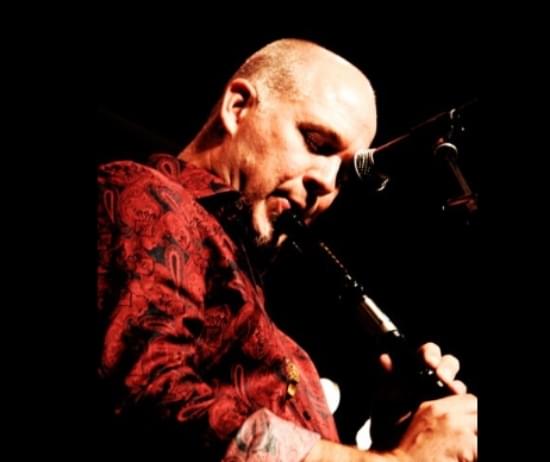
William Hoshal - Composer
“Either if you’re a beginner or a seasoned professional, the Symphonic Virtual Orchestration course is a great place to build on that knowledge and continue learning about music production.”

Medhat Hanbali - Composer
Whether it’s a film, TV show, video game or music production, the information you will learn in this class is very valuable and will be useful for the rest of your career.

Steve Schwartz - Composer
“These courses have been a fantastic experience thus far. I'm already learning more than I ever could. It's far superior than just searching for online tuts. This course is all a hit!.”

Alan Lorden - Creative Director at Rusted Gate Music in Raleigh, North Carolina.
"If you’ve been looking for real world, workable answers and solutions on how to set up and structure an effective film composition recording and production environment this is the course for you. The modern composer has to fill many roles beyond just coming up with the music. You’re also expected to provide score mockups, be the arranger, music editor, sound designer and pretty much anything else that involves the music side of a movie or television show. Film composer Marc Jovani cuts to the chase on setting up workable templating, the pros and cons of many popular sound libraries, best practices for mixing and mastering along with tips on how to handle the variety and complexity of requests you will encounter this business. Marc’s passion for film scoring is only surpassed by his desire to educate both aspiring and established composers to be the best and most competitive music professionals they can be."

Thomas Rhea - VI Control user: Maestro1972
"I am only into day 2, I am so impressed! The chat/interactive video chat, the assignments, and the customer service is WAY more than I thought this experience was going to be."
Praise For The 'Symphonic Virtual Orchestration' Course

“Either if you’re a beginner or a seasoned professional, the Symphonic Virtual Orchestration course is a great place to build on that knowledge and continue learning about music production.”

Whether it’s a film, TV show, video game or music production, the information you will learn in this class is very valuable and will be useful for the rest of your career.

“These courses have been a fantastic experience thus far. I'm already learning more than I ever could. It's far superior than just searching for online tuts. This course is all a hit!.”

"If you’ve been looking for real world, workable answers and solutions on how to set up and structure an effective film composition recording and production environment this is the course for you. The modern composer has to fill many roles beyond just coming up with the music. You’re also expected to provide score mockups, be the arranger, music editor, sound designer and pretty much anything else that involves the music side of a movie or television show. Film composer Marc Jovani cuts to the chase on setting up workable templating, the pros and cons of many popular sound libraries, best practices for mixing and mastering along with tips on how to handle the variety and complexity of requests you will encounter this business. Marc’s passion for film scoring is only surpassed by his desire to educate both aspiring and established composers to be the best and most competitive music professionals they can be."

"I am only into day 2, I am so impressed! The chat/interactive video chat, the assignments, and the customer service is WAY more than I thought this experience was going to be."
Praise For The 'Symphonic Virtual Orchestration' Course

“Andy Hill has the ability to deconstruct and explain the process of writing film scores with extraordinary clarity, all the while imbuing the subject with a fervor that should, in my opinion, be reserved only for European football matches and Baptist revival meetings.”

You MUST get this – While most analytical books are written by academics, Andy was right there in the thick of things as a member of the Disney music department, while the majority of the scores in the book were actually being recorded. Not to mention, it is so alive with his mad passion for film music.

“Andy Hill is among the handful of penetrating minds and ears engaged in film music today.”

“Andy Hill’s ‘Scoring the Screen’ is, like its author, thoughtful, incisive and full of solidly interesting insights into the technique, craft and emotional magic of film scores and the composers who create them.”

“Andrew Hill displays the comprehensive knowledge, wisdom, and reverence required to provide informed and practical insight into the art and craft of composing screen music. His background as a practicing musician, Disney studio music-executive, and college-level educator enables him to intelligently—and sometimes amusingly—reveal the magic behind the film-composer’s curtain.”

“Andy presents his case that the finest composers to have worked in film over the last eighty years have contributed genuine masterpieces of music and drama to our culture. A film score must excel at both to be successful, and this is so beautifully illustrated in Hill’s elegant prose. Having produced new recordings of To Kill A Mockingbird — with Elmer Bernstein — and Patton — with Jerry Goldsmith — and examined these and other scores in great detail with the composers themselves, I found myself very moved by Hill’s like-minded analysis. Part of the film composer’s art is in fact to conceal the effort and the intellect that goes in to the creation of their scores. Hill thankfully lifts the veil. I am thrilled to see such a rare spotlight illuminating the artistry behind these masterworks.”
Flash 1-Day Pre Black Friday SaleOrder Andy Hill's Online Course Now And Save
Regular Price: $497
Get The Course Today For Only:
$97.00
This Special Offer Ends On
This Special Offer Ends On November 4th
Then the price will go up to $497













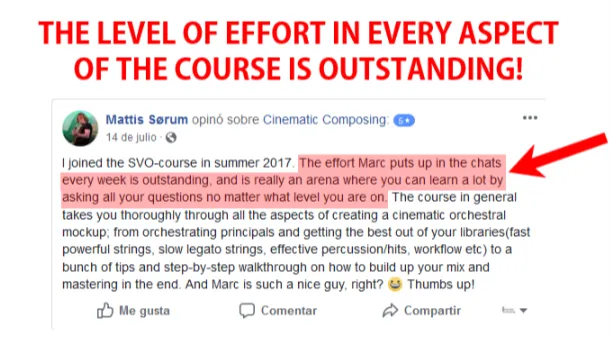


What others have asked
before joining Symphonic Virtual Orchestration Lite
I don't have time to take this course right now. Should I still buy it?
This special offer ends on .
BUT you can go at your own pace. Don’t need to follow the course’s schedule. The course materials do not expire and you’ll have access to them for life. Even for the future course updates and improvements!
The duration is 6-8 weeks approx. You can do it a bit faster, or take as much time as you want/need.

Does this course include assignments?
No, assignments are not included in this version of the SVO course. This is the main difference between this version and the $775 one that you can see find our site.
I'm using ________ (name any sequencer here). Can I still take the course?
We use Cubase. But, all the concepts that you'll learn apply across the board, no matter what sequencer you use. In fact, more than a 1/2 of our students are Logic users.
The same concept about libraries. You can learn and apply all the concepts taught in the course using any basic library (Logic stock orchestral samples, EWQL, etc). Once you're in the course, you'll have a better idea of what is the next library that you wanna buy. Plus, you'll be around a great community of composers who already own those libraries and can give you valuable feedback or advice what library to invest in next.
Also, when you join Symphonic Virtual Orchestration you'll get access to a private Facebook group. The Facebook group is a great place to ask questions if you get stuck. That’s where you’re really going to get a lot of extra help and encouragement when you’re stuck or when you're trying to apply the concepts learned in the course to your own DAW, both from Marc and from other composers who can speak to your exact issues.
Do I need to buy any sample library before taking this course?
Read the answer to the last question 👆
Also, once you enroll to this course, you can get access to discounts on many sample libraries and plugins! Just ask for a certificate of enrollment once you're in.
This course will pay for itself with the amount of money you'll save from educational discounts you'll get! ;)
How long will I have access to the SVO course materials?
You’ll have access to the course materials for life, as well as to the Facebook group AND the weekly chats. You can join any weekly chat that you want, even if your course has finished. And the chat sessions are recorded, so you can watch them at any time.
Do I need a Mac to take this course? What type of computer do I need?
You don't need a Mac for this course. Marc uses a PC. Half of our SVO students are Mac, the other half are PC.
Any computer, desktop or laptop, with an i5 or similar (i7 desired), 4-8Gb of RAM (16 desired), and 150Gb of free HDD storage for samples (SSD desired) will be enough to get you started. You can always upgrade later.
I don't understand English. Is this course in Spanish as well?
All the videos are in English and Spanish. Yes, you can take this course if Spanish is you main language and you struggle with English.
I cannot read music and have never taken orchestration classes or anything like that. I have learned everything by ear. Will I still be able to successfully complete the course?
Honestly, we have lots of fun and engaging conversations with students who don’t have formal training. Sometimes, when you’ve got a lot of training you can develop complexes or insecurities about what is right or wrong, what you should or shouldn’t do when composing, and so forth.
We’re recently getting more students who don’t read music and instead produce by ear. In this course we don’t approach music in a traditional way. We don’t talk about notes. Instead, we approach mockup production as a collection musical ideas, layers, orchestral families, and musical gestures.
In addition, this course puts emphasis on the production side: sound, mixing, plugins, libraries, mastering, and so forth.
If you’re one of those with little or no traditional formal training, you’ll still gain loads of practical, useful information and experience in this course. We’d love to have you on board!


How is the course build? And is there some kind of certificate we receive at the end?
The course consists of weekly lessons, based on videos and PDFs. The course also includes weekly live video-chats with Marc or the Cinematic Composing teachers and the rest of the students, and a private Facebook group where you can ask questions.
Once you get access to the private Facebook group, you'll be able to join periodical masterclasses with Hollywood composers and mixing engineers for free. The last ones we did were with Spider Man composer Christopher Young, Riverdale composer Blake Neely, and mixing engineer Bobby Fernandez, among others.
At the end of the course, you'll get a certificate of completion.
Do you have a refund policy?
Yes. We are giving you a full 7 DAYS to go through the training, implement what you learn, and watch your production skills begin to grow.
If you reach out within 7 days to show us that you haven’t seen any progress, then we’ll be happy to return the investment.
*Conditions apply. Please read Terms and conditions.
Is this the Right course for me? Is it worth the investment?

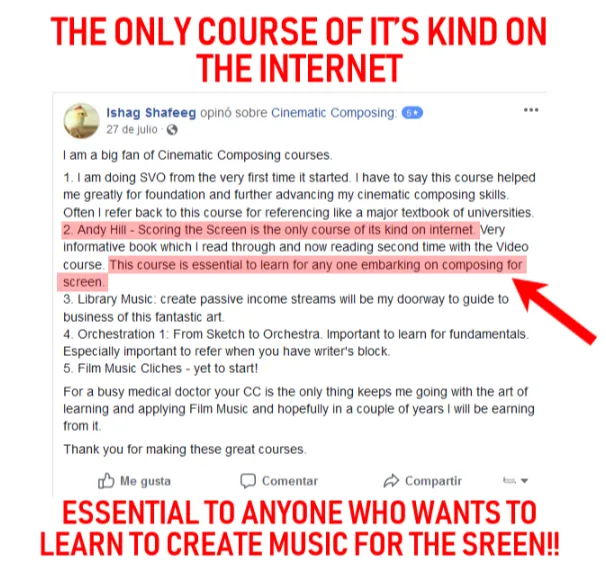
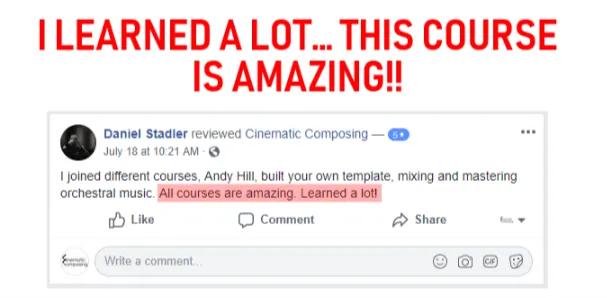

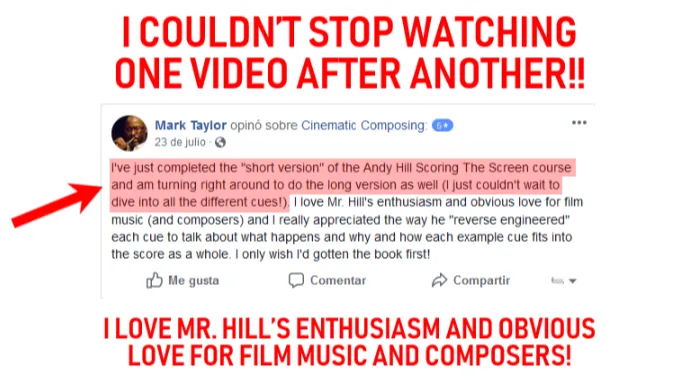
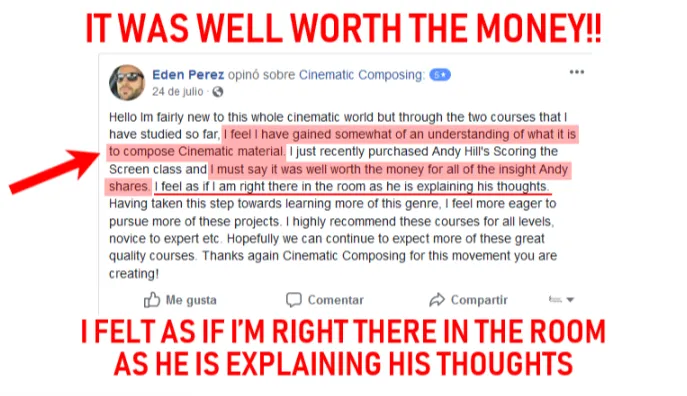


Is this just for beginners or will i also learn advanced concepts?





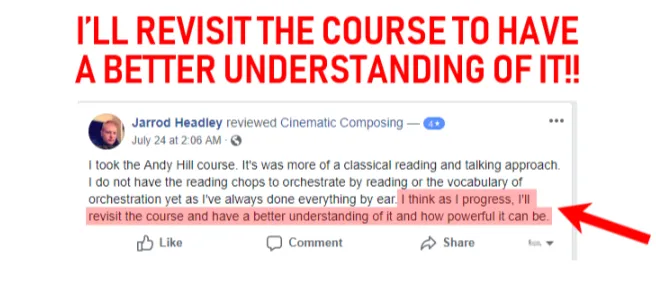
How does the course work? Is it video? Book? Tutorial? How long is it?
Note
This is a video based course. You have also access to the analyzed scores and you can download them.
The course is designed so you can go at your own pace. Don't need to follow the course's schedule. The course materials do not expire and you'll have access to them for life. Even for the future course updates and improvements!
The duration is 1-2 weeks approx. You can do it a bit faster, or take as much time as you want/need. Or you could even take advantage of the discount now, and be doing the course later. The chat sessions get recorded.
Also, you’ll have access to the course materials for life, as well as to the Facebook group AND the weekly chats. You can join any weekly chat that you want, even if your course has finished.

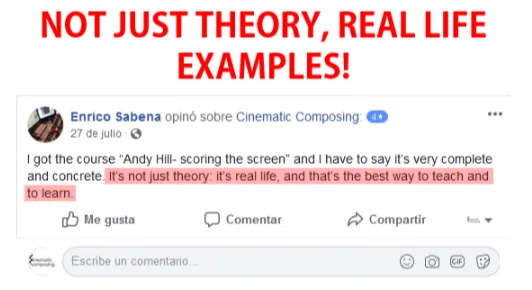

Why Do I Need To Buy This Course If I can Buy The Book?
*Disclaimer: We highly recommend buying the book. You can buy the book here. The book is outstanding and it's a wealth of knowledge. This course does not replace the book. It rather expands some of the concepts from it.






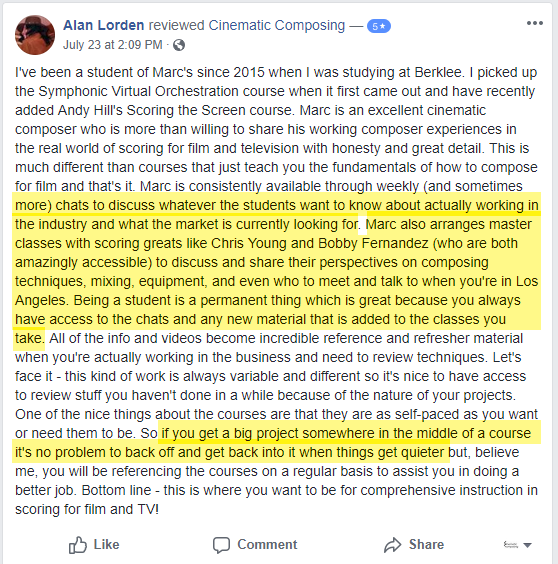



Symphonic Virtual Orchestration Lite
Flash Father's Day Sale!Order Marc Jovani's Online Course Now And Save!

Regular Price: $497
Get The Course Today For Only:
$97.00

This Special Offer Ends On November 4th
This Special Offer Ends On
Then the price will go up to $497

Symphonic Virtual Orchestration
Lite Version
Get This Exclusive ❄️ WINTER SALE ❄️ - 3-Day Flash Sale!Order Marc Jovani's Online Course Now And Save!

Regular Price: $497
Get The Course Today For Only:
$97.00
This Special Offer Ends On November 4th
This Special Offer Ends On
Then the price will go up to $497
Praise For The 'Symphonic Virtual Orchestration' Course

“Andy Hill has the ability to deconstruct and explain the process of writing film scores with extraordinary clarity, all the while imbuing the subject with a fervor that should, in my opinion, be reserved only for European football matches and Baptist revival meetings.”

You MUST get this – While most analytical books are written by academics, Andy was right there in the thick of things as a member of the Disney music department, while the majority of the scores in the book were actually being recorded. Not to mention, it is so alive with his mad passion for film music.

“Andy Hill is among the handful of penetrating minds and ears engaged in film music today.”

“Andy Hill’s ‘Scoring the Screen’ is, like its author, thoughtful, incisive and full of solidly interesting insights into the technique, craft and emotional magic of film scores and the composers who create them.”

“Andrew Hill displays the comprehensive knowledge, wisdom, and reverence required to provide informed and practical insight into the art and craft of composing screen music. His background as a practicing musician, Disney studio music-executive, and college-level educator enables him to intelligently—and sometimes amusingly—reveal the magic behind the film-composer’s curtain.”

“Andy presents his case that the finest composers to have worked in film over the last eighty years have contributed genuine masterpieces of music and drama to our culture. A film score must excel at both to be successful, and this is so beautifully illustrated in Hill’s elegant prose. Having produced new recordings of To Kill A Mockingbird — with Elmer Bernstein — and Patton — with Jerry Goldsmith — and examined these and other scores in great detail with the composers themselves, I found myself very moved by Hill’s like-minded analysis. Part of the film composer’s art is in fact to conceal the effort and the intellect that goes in to the creation of their scores. Hill thankfully lifts the veil. I am thrilled to see such a rare spotlight illuminating the artistry behind these masterworks.”
Flash 1-Day Pre Black Friday SaleOrder Andy Hill's Online Course Now And Save
Regular Price: $497
Get The Course Today For Only:
$97.00
This Special Offer Ends On
This Special Offer Ends On November 4th
Then the price will go up to $497



“Andy Hill (...) gives unparalleled information on how it is created, integrated with film, and then… perceived in the context of the film once it is “out there”. For composers, orchestrators, musicians, filmmakers, historians and fans of film and film music, every “piece of the puzzle” is here…”



